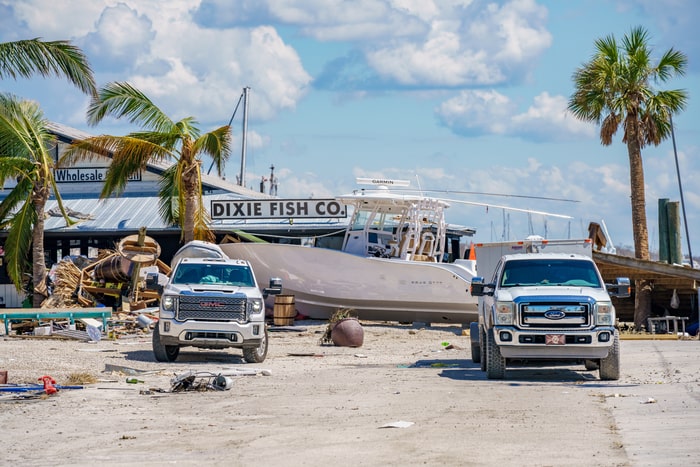
- October 28, 2022
- |security guard company, security guard services
- | 0
Hurricane Safety and Security –
Dwelling in massive storm regions along the southern and eastern coasts of the United States may be a terrifying experience. As a cyclone approaches land, the inhabitants of these locations face the unknown. The chance of losing their houses, the damage of their property, and the threat to their families’ personal safety are all real dangers.
In the wake of Hurricane Ian, which wreaked havoc in Florida, it is evident that we must be prepared for extreme weather. There are certain precautions you may take if you live in a hurricane-prone area to protect your property and family. Preparing for a hurricane before it strikes and understanding what to do during and after a major storm will offer you and your family the greatest chance of surviving the storm safely.
Safety Tips for Hurricanes
Recent hurricanes such as Ian, Katrina, Sandy, Irma, Harvey, and Dorian have left a path of destruction. In contrast to other extreme weather, however, hurricanes may be tracked days in advance. Tracking provides residents in the path of a storm with the opportunity to prepare and adopt safeguards. Still, one can never predict when a hurricane will strike. Although September is the most usual month for hurricanes to make landfall, the true hurricane season stretches from June to November.
Are you worried about the danger of hurricanes? Have you devised a strategy for safety before, during, and after a hurricane? Learn how to keep your house and family safe throughout a dangerous storm by reading on.
Advice for Pre-Season Hurricane Preparation
Prepare an emergency hurricane kit. Prepare a readily transportable bag or container with the things you may need in the event of an evacuation. First-aid kits, flashlights, batteries, tools, cash, and medications are among the emergency supplies that can prove essential.
Have a plan for evacuation. If you must abandon your home, every member of your family must know precisely how to proceed and where to go. Allocate each close relative a function and identify a meeting location. Ensure that your family is aware of the emergency evacuation in the event that communication is lost.
Organize your crucial documents. Travel documents and birth certificates should be stored in a watertight folder that is easily accessible and in a location that is known to the entire family. Stock up on water and food. You can never predict the destructiveness of a hurricane or what sources will be accessible. Include nonperishable food items and bottled water in your emergency kit. Ensure that you have several days’ worth of necessities for each family member.
Prepare your dwelling. Before hurricane season, it is ideal to ensure that your property is as safe and protected as possible. You can take numerous actions to defend your home in advance, such as acquiring full coverage, purchasing materials to reinforce your doors and windows, and installing a generator.
What to Do in the Event of a Hurricane Warning
Reinforce doors and windows. Increase the stability of windows, doors, and other openings using plywood or specialized storm shutters. Windows and doors are particularly vulnerable to strong winds and floodwaters. Fuel up your automobiles. Ensure that your vehicles’ fuel tanks are full prior to the storm. In the event that you are need to escape, you will be able to do so without fretting about fuel shortages along the emergency evacuation.
Register for hurricane warnings. Local authorities and FEMA will provide hurricane alerts and updates. Ensure that you sign up to get these alerts so that you can remain informed about evacuation needs and procedures. Remove huge outside objects. Take precautions by removing or fastening outside furniture, fallen branches, trash cans, and any other unsecured objects that could pose dangers during high winds and heavy downpours.
Have all food and emergency supplies on hand. If your emergency supply and food supplies are not immediately accessible, they will be useless. Ensure that these resources can be rapidly retrieved by storing them in a readily available area.
How to Deal with a Hurricane
Evacuate as directed. Always quickly comply with evacuation orders. Do not believe that you can weather the storm. People are evacuated for a cause — to ensure their safety. Avoid approaching windows and doors. Windows and doors can be broken by winds and floodwaters. Protect yourself in an internal, windowless room on the bottom floor of your residence.
Do not venture outside. Wait until authorities give the all-clear before venturing outdoors. Remember that the absence of precipitation does not always signal that a storm has passed. It may indicate that you are in the midst of a storm and that more is to come. Avoid touching electrical equipment. During a hurricane, the danger of electrocution is extremely great. Turn off large appliances and stay away from anything with an electric charge until the authorities give the all-clear.
As residents return to their residences and neighborhoods after the hurricane has departed, they are still exposed to several safety risks. Observe the following guidelines after a hurricane:
– Wait for permission from the authorities before going home
– Avoid walking through waterlogged regions
– Avoid driving through flooded regions
– Avoid downed electrical lines
– When reentering your home, check floorboards and roofs
– Do not consume tap water.
Prepare Yourself for the Next Major Hurricane
A storm can be very destructive. Be careful to take measures prior to the beginning of hurricane season by gathering the essential supplies, developing a strategy, and strengthening your home. Knowledge and preparation are the cornerstones to preserving your family and property. Contact us to learn more.


